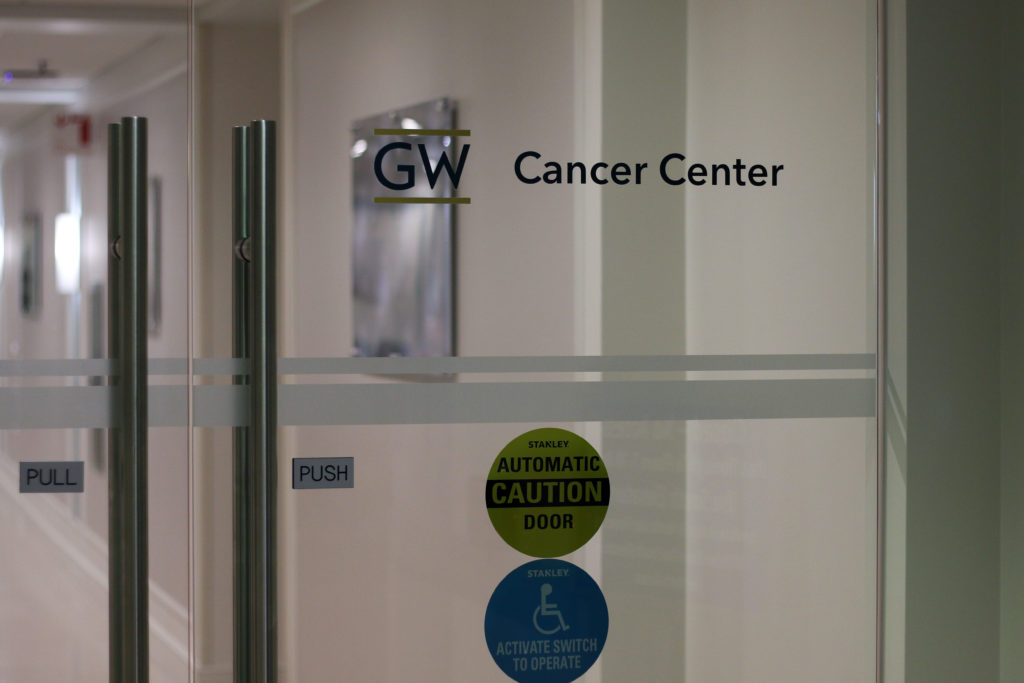GW’s Cancer Center will open a new clinic this fall to offer interdisciplinary care from expert specialty providers.
Physicians said a new gastrointestinal cancer clinic will afford patients a dedicated space to visit doctors – including oncologists, radiologists, pathologists and surgeons – involved in the patients’ specialty cancer care, all in one visit. The clinic is slated to open in October or early November, physicians said.
Officials said the Cancer Center will also bring on a new oncologist who will provide patients with more tailored treatment options as opposed to more general cancer therapies.
Physicians in the Cancer Center said oncologists, surgeons, radiologists and pathologists will all work under the new GI clinic, which will work with other clinics within the Cancer Center. The GI clinic will likely be housed in the Ambulatory Care Center building within the Medical Faculty Associates, physicians said.
Michael Benedict, the associate director of administration and finance for the Cancer Center, said a new GI medical oncologist will lead the center starting Nov. 1. George Kim, a physician and professor from the University of Florida, will take on the role if his D.C. license is approved by the D.C. Department of Health, Benedict said.
“He is an important recruitment as we continue to build expertise in GI malignancies,” Benedict said in an email.
Kim previously worked at the Mayo Clinic in Jacksonville, Fla. and The Johns Hopkins Hospital, according to his resume, which was obtained by The Hatchet. He also held a fellowship at the National Cancer Institute from 1997 to 2002. Kim declined to comment.
Brian Moll, the senior director of operations for the Cancer Center, said the new clinic will be one of the Cancer Center’s multidisciplinary clinics on the first floor of the MFA building and will allow for “seamless referrals” from GI specialists for patients with GI cancer. He said the new oncologist will address the needs of the D.C. community, where GI cancer is the most common and the most fatal type of cancer in the U.S., according to MedStar Georgetown University Hospital.
“Recruiting the best and brightest physicians in areas essential to the growth of the GW Cancer Center and needed in the community it serves will further the effort to achieve NCI designation,” Moll said in an email.
GW’s Cancer Center opened in 2016 and is currently focusing on interdisciplinary research – a priority that officials said could help the center secure a highly coveted grant from the National Cancer Institute.
The Cancer Center also underwent a series of renovations this summer, adding a Multidisciplinary Solid Tumors Clinic, completed in May, that officials said will improve the patient care experience by allowing patients to visit several different specialists in one visit.
Robert Siegel, the director of GW’s Oncology Unit, said Kim will replace James Ahlgren, the center’s former medical oncologist who focused on GI cancer and retired at the end of June. Siegel said the primary responsibility of the new GI medical oncologist will be patient care, an area that the center is hoping to improve with more specialized treatment options.
Ahlgren did not return multiple requests to comment.
“I look at the hiring of Dr. Kim as part of a bigger strategy to pull in more subspecialists and people with particular expertise, as we try to expand the range and depth of our ability to treat these patients,” Siegel said.
He added that he hopes the new position will help with recruiting patients for ongoing clinical trials where new drugs and treatment approaches are tested. Siegel added that the Cancer Center just opened a new clinical section on the ground floor of the ambulatory care building to accommodate more physicians and more patients.
“We’re making significant progress,” he said.
Jianqing Lin, a medical oncologist and an assistant professor of hematology and oncology, said acquiring more highly specialized physicians helps the Cancer Center become more of an academic and research-focused medical center as opposed to private practice, where unspecialized medical oncologists would provide patient care.
“Many academic centers really subspecialize in specific diseases, that way you can raise the level of patient care, clinical research and clinical trials,” Lin said.





